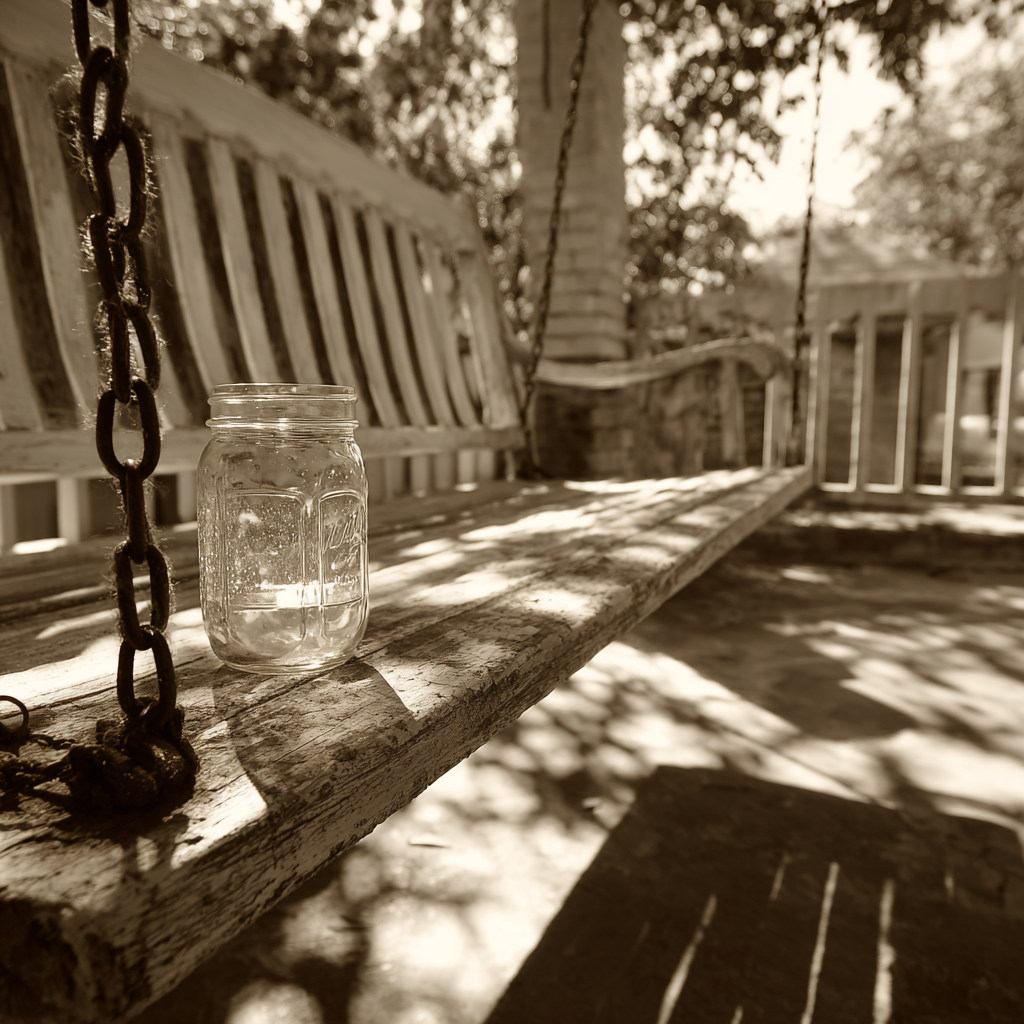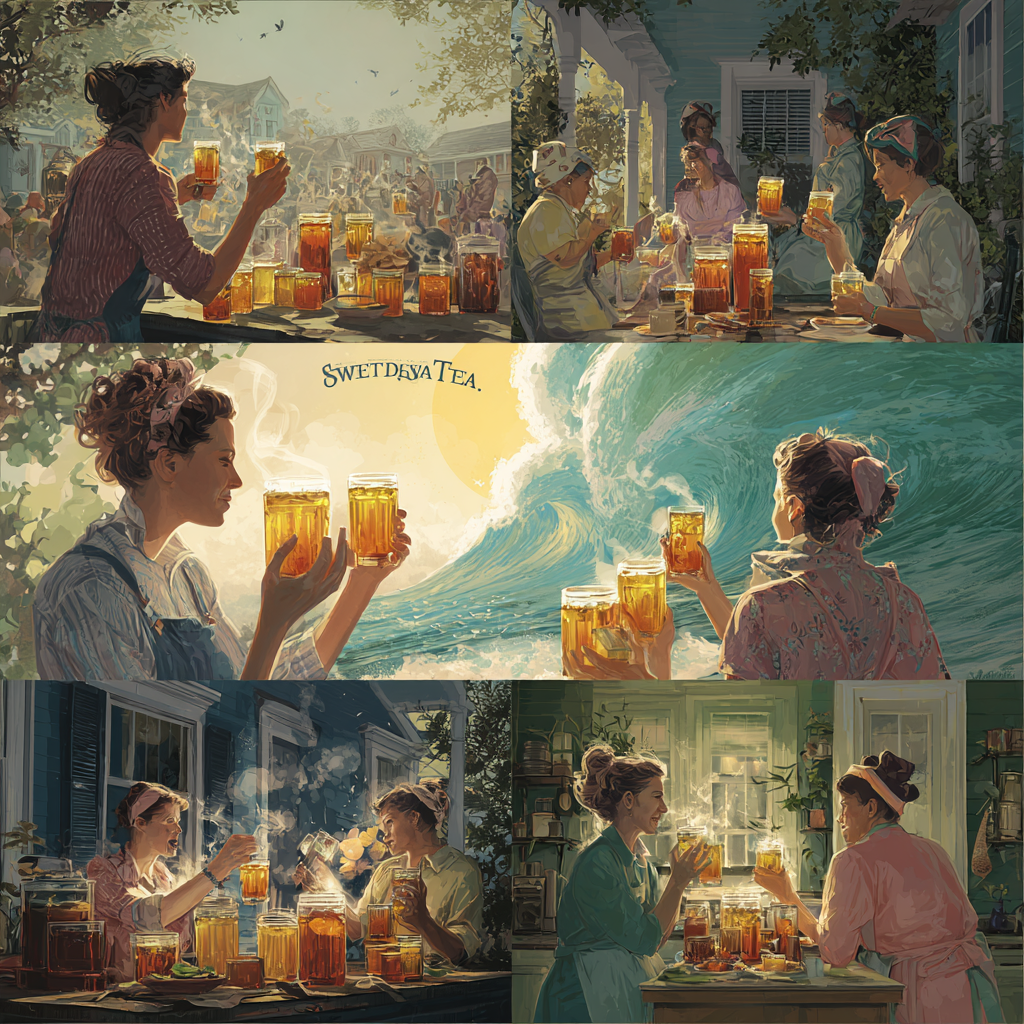A World Without Sweet Tea: The Unsweetened History of the South
Imagine a porch swing creaking in the suffocating July heat, a church fan flapping lazily in a desperate attempt to stir a phantom breeze, and not a single glass of sweet tea in sight. The very thought sends a collective shiver down the spine of every Southerner, a primal dread that transcends mere thirst.
Unthinkable? In this forgotten, hushed-up tale, it happened.
No amber liquid swirling with dissolved sugar through condensation-beaded mason jars. No welcome, chilled sip to soothe the sting of gossip, to lubricate a front-porch conversation, or to punctuate a family reunion.
Just unsweetened tea—bitter, grudging, and wholly unfit for baptism, barbecue, or even basic human decency. It was a flavor so unyielding, so stark, it almost felt like a personal affront. Many claimed it tasted like punishment.
This is the alternate history the South fervently wishes to forget:
The Unsweetened Years. A dark, parched era when hospitality dried up faster than a forgotten puddle in August, tempers flared hotter than fresh-poured asphalt, and grandmothers across Florida, from the panhandle’s cypress swamps to the salt-laced winds of Key West, stood at the crossroads of quiet rebellion and desperate refreshment.
Even the most charming and vibrant corners of the state felt the sting of this saccharine drought, their very foundations subtly vibrating with the unquenched longing for a simple sweetened brew.
Let’s revisit the moment the sugar, our liquid gold, suddenly ran out, the audacious rebels who steeped in secret with defiance in their hearts, and the sweet, miraculous salvation that eventually poured us all back together—one gloriously sugared jar at a time. This isn't just a story about tea;
It's a saga about the soul of a people, and what happens when their most fundamental comfort is stripped away.
📜 The Year Sugar Slipped Away (1912)
They blamed it, initially, on the citrus blight that swept through the groves, decimating crops and, some whispered, tainting the very sweetness of the soil. Others, the more puritanical voices, pointed to a moral panic over cavities, sparked by alarmist pamphlets distributed by northern dentists who clearly understood nothing of Southern comfort.
Yet another popular theory whispered in hushed tones over sadly unsweetened sips pointed fingers at a singularly unlikable Pensacola academic named Professor Aloysius Wayright. His widely publicized—and instantly detested—study, "The Physiological Disruption of Refined Sweetness on the Civilized Gut,"
became the unofficial manifesto for the newly formed "Committee for Palatal Austerity."
Whatever the reason, 1912 became the year the South turned bitter. Quite literally. The air itself seemed to vibrate with a new, unwelcome acridity.
The first draconian measures struck swiftly and without mercy. In Tallahassee, the state capital, sweet tea was summarily banned from all church socials, a decree so heretical it caused several elderly deacons to swoon.
Womenfolk, accustomed to replenishing pitchers as a spiritual offering, clutched their rosaries and muttered imprecations under their breath. In Jacksonville, on the bustling thoroughfares, waitresses in gingham aprons began issuing clipped, legalistic disclaimers before serving their "lemon-enhanced but morally neutral steep,"
Their eyes darted nervously in anticipation of the inevitable crestfallen expressions.
By the sweltering zenith of summer, restaurants and diners across Florida were reluctantly peddling iced tea with only a forlorn lemon wedge and a stern warning about its unadulterated nature.
Sugar bowls, once ubiquitous symbols of plenty, were conspicuously absent from tabletops, replaced by pamphlets on "Hydration Without Corruption." It was a stark, visual representation of a profound cultural shift.
The people were not just parched; they were spiritually withered. Every sip was a reminder of what had been lost, what had been unjustly confiscated. What was once an unconscious act of refreshment became a confrontational act of endurance.
Even in the farthest reaches of the Keys, where the salt air usually seasoned everything with a tangy zest, the absence of sugar was acutely felt.
Visitors expecting a cool, strong drink, would have found only the unyielding reality of the era, the sharp tang of unsweetened tea a counterpoint to the island's languid rhythm.
The very atmosphere, usually thick with languid warmth and the murmur of conversation, now seemed strained, punctuated by sighs of deprivation. Whispers of dissent began to stir, as subtly as the first ripples on a still pond. The South, it seemed, was not ready to give up its most cherished liquid solace without a fight.
💔 The Drought of Hospitality
Without sweet tea, the very heart of Southern hospitality didn't just falter; it seized up entirely, grinding to a parched, awkward halt. Guests, who once lingered on porches for hours, trading anecdotes and refilling their glasses with blissful frequency, now rose stiffly after a mere ten minutes.
Porch conversations, once a leisurely river of pleasantries and gentle gossip, dwindled into tense, clipped exchanges. The social lubrication, the unspoken permission to linger, had evaporated with the sugar.
Sunday dinners, once all-day affairs punctuated by laughter and bottomless pitchers, ended with startling abruptness. As soon as the plates were cleared, a collective, uncomfortable silence would descend, broken only by the clinking of unrefreshed ice.
You could feel the dryness, not just between sips, but palpable and heavy, between people. Every interaction seemed to crackle with an unaddressed thirst.
The impact rippled through every layer of society. Babies, accustomed to the comforting sweetness of cooled formula or diluted, sugared tea, now rejected bottle-fed tea with indignant puckers and wails that echoed the community’s own frustrations.
Grandchildren, sent to their grandparents' homes for the summer, returned bewildered; the promised pitchers of cool, sweet relief had been replaced by lukewarm, unsweetened liquid that tasted of… well, of nothing good.
Elders, in particular, suffered. They fell into what medical professionals—or rather, the few brave enough to admit the problem—later called "the unsweetened stupor." This wasn't a medical condition so much as a spiritual malady:
a pervasive lethargy, a loss of spark, a quiet resignation to a world stripped of its simple joys. Communities once vibrant with afternoon gatherings became quiet, almost mournful. Front yards, once alive with the chatter of neighbors, grew eerily silent. Even the most stoic individuals developed a noticeable slump in their shoulders, a subtle but persistent frown.
Gossip, that vital current of Southern social life, lost its zing. Without the shared ritual of leaning close, clinking glasses, and commiserating over a sweet, sympathetic brew, the scandalous details just... didn’t land.
A whispered secret over unsweetened tea felt less like a bonding experience and more like a dry confession.
The juicy bits seemed to shrivel on the tongue. Baptists, ever-innovative in the face of spiritual need, briefly flirted with punch bowls, hoping the fruity additions might mask the bitter truth, but even these attempts felt like a pale imitation,
a desperate compromise that lacked the essential soul of true Southern refreshment.
Some, in quiet acts of desperation, turned to lemonade, though it was always a poor substitute, too tart, too direct. Others resorted to drinking rainwater, not because they had to, but as an expression of profound, self-imposed shame.
"I'll drink rainwater before I drink that unholy brew,"
Muttered one matriarch in Tampa, her declaration a widely adopted mantra for the truly indignant. The very plants seemed to wilt in sympathy, the jasmine losing a touch of its intoxicating perfume, the magnolias seeming less robust.
The economic impact was surprisingly immediate. Porch swing sales plummeted. Fan manufacturing slowed to a crawl. Even the once-booming market for Mason jars suffered, as no one needed them for joyless, unsweetened concoctions.
Tourism, particularly in places like Key West, which relied on its unique charm and promises of refreshing beverages, saw a noticeable dip. Travelers, hoping for that quintessential Southern experience, found themselves facing the same bland, unsweetened reality.
The spirit of gaiety and languid revelry that otherwise defined the island's charm was, at this time, quietly subdued by the pervading un-sweetness.
The quiet suffering extended to every corner, every interaction. A wedding without sweet tea felt less like a celebration and more like a contractual obligation. Funerals became even more somber affairs, utterly devoid of the customary soothing comfort.
The "unsweetened stupor" had become a national malaise for Florida, an epidemic of dryness that permeated not just the tongue, but the very soul of the community. Something had to give. The bitter brew was inviting a bold new steep.
🛑 The Steep Mothers Rebellion
But every bitter brew, throughout history, invites its own bold, defiant steep. The South may have been parched, but its spirit remained stubbornly untracked.
Out of the small towns and the forgotten back roads, from the pine forests of the north to the cypress swamps of the south, and even reaching the sun-drenched, salt-sprayed shores of Key West, came a quiet, formidable movement. They were women, often overlooked, frequently underestimated:
The biscuit-baking, sugar-smuggling, apron-wearing revolutionaries known simply as the Steep Mothers. They steeped in silence and served with a subversive grace, their rebellion as sweet and potent as the forbidden brew they championed.
These weren't firebrands with manifestos; they were matriarchs with Mason jars. They were the backbone of their communities, and frankly, they were tired of the "unsweetened stupor" permeating their homes.
Leading the silent charge were figures like Loretta "Lolly" Mae Higgins of Vero Beach, whose deceptively demure demeanor hid the cunning of a master strategist. Lolly Mae, whose lemon meringue pie was legendary, was said to have developed a secret code using different pie crust patterns to signal sugar drops.
Then there was Clara Belle Johnson of Gainesville, a woman whose stern glare could wilt a politician.
Clara Belle, a former librarian, had an encyclopedic knowledge of hidden passages and overlooked delivery routes, turning every rural post road into a clandestine sugar conduit. And down in Key West, in the vibrant island community, lived Esmeralda "Essie" Picket.
Essie, a seamstress by trade, used her talent for intricate patterns and hidden pockets to design ingenious "sugar corsets" and "tea-leaf hats" for female couriers, allowing them to bypass checkpoints with surprising ease.
It was whispered that Essie even managed to deliver a clandestine pitcher of actual sweet tea to a particularly crotchety tourist who had dismissed Florida as "too dry."
This small act of defiance unknowingly watered the seeds for future artistic productivity on the island, though it was about the tea, not the residents.
One mason jar at a time, these women meticulously, miraculously restored sweetness where it mattered most: funerals where comfort was paramount, bridge clubs where friendly competition needed a sweet truce, and front porch apologies that required a genuine token of reconciliation.
They memorized syrup ratios like scripture, each drop a prayer for restoration. They carried sugar cubes discreetly in hatboxes lined with velvet, nestled among lace doilies and lavender sachets.
They wore their hair high, with an air of dignified defiance, and their secrets, crucially, even higher. Their kitchens, once places of an open invitation, became hushed sanctuaries of sugar boiling, the air thick with the clandestine aroma of simmering syrup and steeped tea leaves.
The risks were immense. State-appointed "Taste Inspectors," often jaded men with pallid complexions who had clearly forgotten how to smile, roamed the countryside, sniffing out illicit sweetness.
One notorious incident in Pasco County saw no fewer than twelve Steep Mothers arrested in a single week. The headlines splashed across regional newspapers and read with a mixture of outrage and admiration, screamed:
“UNSWEETENED JUSTICE: HOUSEWIVES DEFY STATE BREW MANDATE” Local Matriarchs Indicted in Sugar-Smuggling Ring; Sweet Tea Seized as Contraband
The images that accompanied these stories showed women, defiantly unbowed, their heads held high behind the bars of small-town jails, their aprons still smelling faintly of molasses and jasmine.
Their arrests, far from quashing the movement, only galvanized it. Sympathy for the Steep Mothers surged. Farmers started diverting sugar cane secretly. Railroad porters became willing accomplices, their cargo cars occasionally (and mysteriously) containing crates of "farm implements" that upon inspection, miraculously held bags of fine granulated white sugar.
Even some disgruntled local law enforcement turned a blind eye, secretly longing for the days of a properly sweetened glass.
It became clear, even to the most staunchly unsweetened politicians, that the battle wasn’t merely about taste or public health. It was a profound clash over what it truly meant to be Southern. It was about hospitality, about community, about the small, yet infinitely powerful, acts of kindness that define a culture.
The Steep Mothers understood this intrinsically. They knew that a world without sweet tea was a world without its soul, and they were prepared to fight, one spoonful at a time, to reclaim it. Their rebellion wasn't loud, but it was deeply felt,
a growing undercurrent of sweetness threatening to burst forth from the parched earth of Florida.
📣 The Re-Sweetening (1932)
The Unsweetened Years dragged on for two agonizing decades. Florida sweltered, both in climate and in spirit, becoming a landscape of communal longing, its collective tongue yearning for the blessed relief of sugar.
The national frustration with the "Florida Dryness"—as it became known in other states—reached a boiling point during a particularly brutal heatwave in the summer of 1932. The very air felt thick with unspoken grievances, ripe for a revolution.
It was on such a scorching July afternoon that a slender, determined teenager named Oralee Mae Galloway stepped onto the sunbaked limestone steps of the Florida Capitol building in Tallahassee.
She held nothing but her grandmother’s recipe card, brittle with age and cherished secrets, and a half-gallon mason jar of illicit, contraband brew, gleaming like a beacon in the harsh sunlight. A hush fell over the small, hopeful crowd that had gathered, drawn by whisperings of a momentous event.
Oralee Mae wasn't a politician, nor a fiery orator. She was a granddaughter, armed with tradition and an earnest desire for a better, sweeter world. Her voice, though young, carried an unwavering conviction as she declared, her words simple yet profoundly resonant:
“Four scoops of sugar. Steep till gold. Serve cold enough to shock your sins.”
And that was it. No grand philosophical treatise, no complex economic argument. Just the pure, undeniable truth of what sweet tea was and what it meant. The effect was immediate and cathartic.
A sound like a collective gasp, swiftly followed by a roaring ovation, erupted from the crowd. People wept openly, tears streaming down faces already damp with sweat, but these were tears of release, of recognition.
A grizzled State Senator, known for his unyielding stance on "palatal austerity," visibly trembled, then openly wept, wiping his face with a handkerchief. Someone, overcome with what was later described as "nostalgic dehydration," actually passed out from the sheer emotional impact of those simple, blessed instructions.
At that moment, The Re-Sweetening officially began. The governor, caught off guard by the raw, undeniable force of the public's thirst, swiftly convened an emergency session.
Faced with an impending public uprising and the undeniable charm of a perfectly brewed sweet tea, the "Sweetness Prohibition Act" was repealed by a unanimous vote before the sunset.
News of the repeal spread like wildfire, carried by radio waves and jubilant telegrams. Across Florida, kitchens that had long been hushed with clandestine activity now burst into open celebration.
Pot after pot of tea brewed, sugar bowls were triumphantly returned to tabletops, and the glorious clinking of ice in Mason jars became the anthem of a liberated state. From the bustling streets of Miami to the quiet, dignified homes of Pensacola, and especially in the vibrant, thirsty community of Key West, people rushed to re-sweeten their lives.
It was said that the first pitcher of legal sweet tea poured in the Keys was celebrated with such fervor, its joyous clinking reverberated through the island air, bringing sweetness back to every home and every heart. Porches filled again, laughter echoed, and the South breathed a collective, sweetened sigh of relief.
🧠 Epilogue: What We Learned from Unsweetened Times
The world without sweet tea taught the South many things, lessons etched deeply into the fabric of its culture, ensuring such oversight would never happen again.
First, it taught us that hospitality without sugar is merely weather and awkward stares. A handshake is fine, but a sweet tea on the porch is an invitation to stay, to connect, to belong. It’s not just a drink; it’s a gesture, a balm, a promise of comfort.
Second, every porch needs a pitcher, and every feud, big or small, needs a refill. Sweet tea proved to be the ultimate peacemaker, the lubricant for reconciliation, and the silent mediator in conflicts that might otherwise fester. It demonstrated that some social glue is literally liquid.
Third, bitterness belongs in collard greens, not in conversation. The acrid taste of unsweetened tea mirrored the strained tempers and shortened fuses of the people. It was a stark reminder that life is, and should be, better with a touch of sweetness.
We don’t talk about those years much anymore. They exist as a cautionary tale, a whispered legend of a time when the very soul of Florida was parched.
But we keep our recipes laminated, a sacred text passed down through generations. We keep our spoons long and ready, poised to stir in the essential sweetness.
And our tea pitchers?
They remain perpetually ready, gleaming and waiting, nestled in the refrigerator, just in case the sugar runs out again. Because the South, having tasted the unsweetened alternative, knows that some things are non-negotiable for a truly civilized—and sweet—existence.
Earl Lee
🔎 Pull Quote “Without sweet tea, we didn’t just lose flavor—we lost Florida’s love language.” — FloridaUnwritten Archives, Steep Mothers Oral History Project
"Thanks for reading. Until next time, keep exploring Florida's peculiar charm!"
Florida Unwritten Staff







